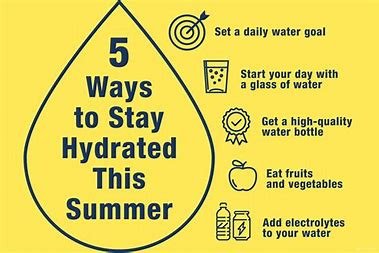Water serves as a building block in all of our body‘s cells as well as in the many tissues and compartments. Due to its high heat capacity, water aids in thermoregulation by reducing body temperature fluctuations in warm or cold environments

Set a daily water goal:
Use apps or alarms to remind you to drink water at regular intervals.
| Time | Amount | Action |
| 7:00 AM | 250 ml | Drink a glass of water upon waking up |
| 9:00 AM | 250 ml | Drink water after breakfast |
| 11:00 AM | 250 ml | Mid-morning hydration break |
| 1:00 PM | 250 ml | Drink water with lunch |
| 3:00 PM | 250 ml | Afternoon hydration break |
| 5:00 PM | 250 ml | Drink water after work |
| 7:00 PM | 250 ml | Drink water with dinner |
| 9:00 PM | 250 ml | Evening hydration break |
1. Carry a Reusable Water Bottle
Having a water bottle with you at all times makes it easy to sip water regularly. Choose a bottle that you find convenient to carry around, whether it’s for work, travel, or workouts.
2. Set Hydration Reminders
Use apps or set alarms on your phone to remind you to drink water at regular intervals. This can be especially helpful if you tend to get caught up in your activities and forget to hydrate.
3. Drink Water Before Meals
Having a glass of water before each meal can help you stay hydrated and may also aid in digestion. It can also help control your appetite and prevent overeating.
4. Flavor Your Water
If plain water feels boring, add natural flavors like lemon, cucumber, mint, or berries. These additions can make water more enjoyable and encourage you to drink more.
5. Eat Water-Rich Foods
Incorporate foods with high water content into your diet. Some examples include:
- Watermelon
- Cucumber
- Oranges
- Strawberries
- Lettuce
- Celery
6. Start and End Your Day with Water
Drink a glass of water first thing in the morning to kickstart your hydration for the day. Similarly, have a glass of water before bed to stay hydrated overnight.
7. Monitor Your Fluid Intake
Keep track of how much water you’re drinking each day. You can use a water-tracking app or a journal to log your intake and ensure you’re meeting your hydration goals.
8. Choose Hydrating Beverages
In addition to water, you can include other hydrating beverages like herbal teas, coconut water, and diluted fruit juices. Avoid sugary drinks and excessive caffeine, as they can contribute to dehydration.
9. Listen to Your Body
Pay attention to signs of dehydration such as dry mouth, dark urine, fatigue, and dizziness. Drink water as soon as you feel thirsty to prevent dehydration.
10. Make it a Habit
Incorporate hydration into your daily routine. Make it a habit to drink water at specific times, such as after waking up, during meals, and before, during, and after exercise.
* Conclusion *
Staying hydrated is crucial for maintaining overall health and well-being. By following practical tips such as carrying a reusable water bottle, setting hydration reminders, and incorporating water-rich foods into your diet, you can ensure that your body receives the hydration it needs to function optimally. Proper hydration supports cognitive function, physical performance, skin health, and helps in detoxifying the body.
